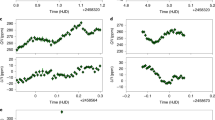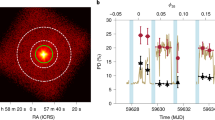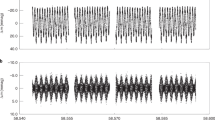Abstract
MEASUREMENTS of the polarisation of nova Vulpeculae 1976 are reported. The linear polarisation seems to have an interstellar origin and so can be used to estimate the reddening and distance of the nova. Nova Vuleculae 1976 was discovered at about the peak of its brightness on October 21 by the British amateur astronomer Mr Alcock.
This is a preview of subscription content, access via your institution
Access options
Subscribe to this journal
Receive 51 print issues and online access
$199.00 per year
only $3.90 per issue
Buy this article
- Purchase on Springer Link
- Instant access to full article PDF
Prices may be subject to local taxes which are calculated during checkout
Similar content being viewed by others
References
Serkowski, K., Mathewson, D. S., and Ford, V. L., Astrophys. J., 196, 261 (1975).
Hall, J. S., Pub. U. S. Naval Obs., 17, VI (1958).
Martin, P. G., and Campbell, B., Astrophys. J., 208, 727 (1976).
Fitzgerald, M. P., Astron. J., 73, 983 (1968).
IAU Circ., No 2997.
Author information
Authors and Affiliations
Rights and permissions
About this article
Cite this article
MARTIN, P., MAZA, J. & ANGEL, J. The polarisation of nova Vulpeculae. Nature 265, 314–315 (1977). https://doi.org/10.1038/265314a0
Received:
Accepted:
Issue Date:
DOI: https://doi.org/10.1038/265314a0
Comments
By submitting a comment you agree to abide by our Terms and Community Guidelines. If you find something abusive or that does not comply with our terms or guidelines please flag it as inappropriate.



